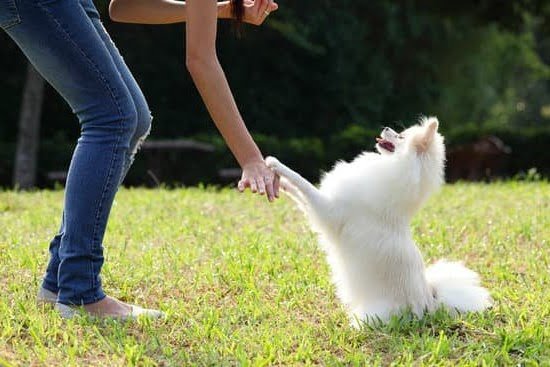Are you wondering, “Can dog still be trained at 2 year old?” Contrary to popular belief, training a 2-year-old dog is entirely possible and comes with numerous benefits.
Many people falsely assume that dogs can only be trained when they are puppies, but the truth is that training an older dog can be just as effective. In this article, we will explore the potential for training a 2-year-old dog and how it can positively impact their behavior and overall well-being.
It is commonly thought that once a dog reaches a certain age, they are set in their ways and cannot be taught new behaviors. However, understanding the stages of canine development reveals that dogs continue to learn throughout their lives. A 2-year-old dog is still in its prime learning stage, making it an optimal time to engage in training activities.
Training a 2-year-old dog carries with it many advantages. Not only does it provide mental stimulation for the dog, but it also enhances their obedience and social skills. Additionally, addressing any behavioral challenges at this stage allows for a better quality of life for both the dog and its owners. Throughout this article, we will delve into the importance of training older dogs and offer valuable insights on how to do so effectively.
Understanding Canine Development
Dogs go through several developmental stages as they grow from puppies to adults. At 2 years old, dogs have reached a stage where they are considered young adults in terms of their physical and mental development.
Understanding the learning abilities of a 2-year-old dog is crucial in determining the effectiveness of training during this stage. At this age, dogs have gone beyond the puppy stage and have the capacity to concentrate for longer periods and understand more complex commands.
Two-year-old dogs have typically passed the critical socialization period, allowing them to focus more on learning specific behaviors and commands. Their attention span has increased, making it easier for them to grasp new concepts and instructions. Additionally, at 2 years old, dogs have typically outgrown most of their puppy habits, making it an opportune time to establish better behavior through training.
It is important for pet owners to recognize that although training a 2-year-old dog may pose some challenges compared to puppies, it is definitely not too late. Understanding a dog’s developmental stage at 2 years old provides insight into their learning capabilities and behavior patterns which can be beneficial when implementing training strategies that are best suited for this age group.
| Canine Development Milestones | Characteristics |
|---|---|
| Socialization Period | Dogs have typically passed the critical socialization period at this age. |
| Increased Attention Span | Dogs are capable of concentrating for longer periods and understanding more complex commands. |
| Maturity Level | At this age, dogs have reached the young adult stage in terms of physical and mental development. |
Importance of Training at 2 Years Old
Training a 2-year-old dog is not only possible but also highly beneficial for both the pet and its owner. Many people believe that dogs can only be trained when they are puppies, but this is a common misconception. In fact, training a 2-year-old dog can lead to significant improvements in behavior, obedience, and overall quality of life for the canine companion.
At 2 years old, dogs have typically passed through key developmental stages and have acquired a better understanding of their environment. This makes them more receptive to learning new commands and tricks. While older dogs may require more patience and consistent training, they are capable of mastering new skills and behaviors with the right approach.
Training a 2-year-old dog is essential for addressing behavioral challenges that may have developed over time. By implementing positive reinforcement methods and consistent training techniques, owners can help their dogs overcome issues such as leash pulling, jumping on people, excessive barking, or separation anxiety. Additionally, correcting these behaviors can lead to a deeper bond between owner and pet.
| Benefits of Training | Impact on Behavior |
|---|---|
| Improved behavior | Correcting bad habits |
| Stronger bond between owner and pet | Reduced behavioral challenges |
Behavioral Challenges at 2 Years Old
When a dog reaches the age of 2, they may start to exhibit certain behavioral challenges that were not present during their puppy stage. This is due to the fact that they are transitioning from adolescence to adulthood, and hormonal changes can play a significant role in their behavior.
Common behavioral issues in 2-year-old dogs include leash pulling, jumping on people, excessive barking, and aggression towards other animals or humans. These challenges can be frustrating for dog owners, but it is important to understand that training can help overcome these issues.
Training Can Help Overcome Behavioral Issues:
Training plays a crucial role in helping 2-year-old dogs overcome their behavioral challenges. Through consistent and positive reinforcement methods, undesirable behaviors can be corrected while fostering good habits in their place. Additionally, training provides mental stimulation for the dog, which can help address other underlying issues such as anxiety or boredom. By establishing clear boundaries and expectations through training, owners can effectively address and modify their dog’s behavior.
Positive Reinforcement Methods and Consistency:
When training 2-year-old dogs, positive reinforcement methods are often most effective. This involves rewarding desirable behaviors with treats or praise to encourage the dog to repeat those actions in the future. It is important for owners to remain consistent in their training approach, as mixed signals can confuse the dog and hinder progress. By consistently applying positive reinforcement techniques and setting clear expectations, owners can successfully address the behavioral challenges of their 2-year-old dogs.
Training Techniques for 2-Year-Old Dogs
When it comes to training a 2-year-old dog, positive reinforcement methods are highly effective. This involves rewarding your dog with treats or verbal praise when they exhibit the desired behavior. By doing so, you are encouraging them to repeat the behavior in the future. Additionally, using a clicker to mark the exact moment your dog performs the desired action can be a useful tool in reinforcing positive behavior.
Consistency is key when training a 2-year-old dog. Establishing a routine and consistently using the same commands will help your dog understand what is expected of them. It’s important for all members of the household to be on board with these techniques and use them consistently, as inconsistency can lead to confusion for your dog.
In addition to positive reinforcement and consistency, it’s important to remain patient and understanding throughout the training process. Remember that older dogs may take longer to learn new behaviors compared to puppies, but with dedication and perseverance, it is absolutely possible to successfully train a 2-year-old dog.
By utilizing these training techniques, owners can effectively communicate their expectations and desires with their 2-year-old dogs while strengthening their bond and enhancing their overall well-being.
Overcoming Training Obstacles
Training a 2-year-old dog certainly comes with its challenges, but with the right approach and mindset, these obstacles can be overcome. It’s important to acknowledge the potential hurdles that may arise during the training process and to be prepared to handle them effectively.
Potential Hurdles in Training an Older Dog
One common obstacle when training a 2-year-old dog is their established habits and behaviors. Unlike puppies, older dogs may have already developed certain habits that are difficult to break. Additionally, they may have experienced different environments and interactions which could impact their behavior during training. It’s important for trainers to be patient and understanding of these potential challenges.
Tips for Handling Resistance During Training
When faced with resistance during training, it’s crucial for the trainer to remain calm and composed. Forcing a 2-year-old dog to comply with commands can result in increased resistance and even negative behavior. Instead, trainers should focus on positive reinforcement techniques such as using treats or toys to reward good behavior. Consistency is also key – establishing a routine and consistently reinforcing desired behaviors will help overcome resistance.
Seeking Professional Guidance
For those struggling with overcoming training obstacles, seeking professional guidance can be incredibly beneficial. Dog trainers and behaviorists have expertise in working with older dogs and can provide personalized strategies for addressing specific challenges. They can also offer valuable insight into understanding a 2-year-old dog’s behavior and how best to modify it through training.
By acknowledging these potential obstacles and being proactive in addressing them, it is possible to successfully train a 2-year-old dog. With patience, consistency, and proper guidance, old habits can be changed and new behaviors instilled in our beloved furry companions.
Success Stories
When it comes to training 2-year-old dogs, success stories are plentiful and can serve as inspiration for other dog owners. The experiences of these success stories demonstrate that older dogs are not set in their ways and can still learn new behaviors with the right training techniques.
Here are some of the most notable success stories of training 2-year-old dogs:
- Max, a 2-year-old Labrador, was initially stubborn and disobedient. However, with consistent positive reinforcement training, he transformed into a well-behaved and obedient companion. His owner’s patience and dedication to training paid off, proving that older dogs are capable of change.
- Bella, a 2-year-old rescue dog with behavioral issues, was successfully trained through the use of reward-based training methods. Despite her troubled past, Bella’s behavior improved significantly with the implementation of positive reinforcement techniques.
- Charlie, a 2-year-old German Shepherd mix, had a tendency to exhibit destructive behaviors due to separation anxiety. Through structured training exercises and gradual desensitization to being alone, Charlie overcame his anxiety and destructive habits.
These success stories showcase the potential for positive change in 2-year-old dogs through effective training methods. By understanding the experiences of others, dog owners can gain confidence in their ability to train their own older dogs effectively.
Conclusion
In conclusion, the idea that dogs can only be trained when they are puppies is a common misconception. Training a 2-year-old dog has numerous benefits, including the ability to shape their behavior and obedience, as well as to address any behavioral challenges that may have emerged during their development.
It is important for dog owners to understand the learning abilities of a 2-year-old dog and recognize the potential for old habits to be changed through proper training.
While there may be some behavioral challenges in 2-year-old dogs, training can help overcome these issues. Positive reinforcement methods and consistent training techniques have been proven to be effective in shaping a dog’s behavior. It is also crucial for owners to be prepared for potential obstacles and resistance during training, but with patience and perseverance, these can be overcome.
The success stories of many individuals who have successfully trained their 2-year-old dogs serve as motivation for others to consider embarking on this journey. By providing resources and encouragement to readers, it is hoped that more people will recognize the potential for growth and development in older dogs, ultimately leading to happier and more well-behaved furry companions.
Frequently Asked Questions
Is 2 Years Old Too Old to Train a Dog?
Training a dog can happen at any age, including 2 years old. While it might be easier to start training when the dog is a puppy, older dogs can still learn new behaviors with patience and consistency. It’s important to remember that all dogs are different, so some 2-year-old dogs may still be very receptive to training.
Can You Still Teach a 2 Year Old Dog Tricks?
Yes, you can still teach a 2-year-old dog tricks. Dogs of this age are typically still capable of learning new things and can benefit from mental stimulation through training and learning new commands or tricks. Again, it’s important to be patient and consistent with your training efforts.
At What Age Can You No Longer Train a Dog?
There isn’t a specific age at which you can no longer train a dog. Throughout their lives, dogs can continue to learn and adapt, so it’s never too late to work on training or teaching them new behaviors.
Older dogs may require more patience and understanding, but they are still capable of learning and improving their behavior through training efforts.

Welcome to the blog! I am a professional dog trainer and have been working with dogs for many years. In this blog, I will be discussing various topics related to dog training, including tips, tricks, and advice. I hope you find this information helpful and informative. Thanks for reading!





